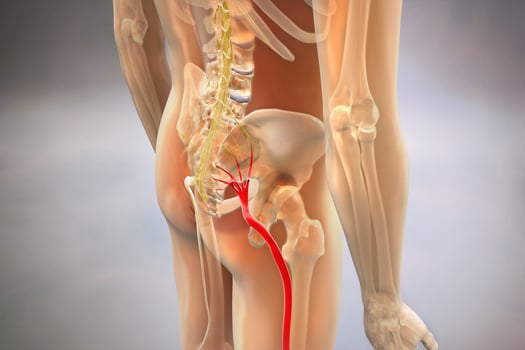
Sciatica typically subsides within a matter of weeks or months when patients are diligent about managing the symptoms. However, there are times when sciatica may get worse, although it can be difficult to tell if this is happening, since flare-ups are sometimes a part of sciatica. This article explains how to tell if sciatica is getting worse.
Symptoms Show Up More Often
It is not unusual for sciatica symptoms to come and go during regular daily routines. If you notice your symptoms returning or lasting longer more often than usual, your sciatica could be getting worse. One possible cause is a herniated disc that shifts. Other potential causes of worsening sciatica include:
• Poor posture
• Excess weight
• Wearing heels that are too high
• Not properly lifting things
.
Medication Is Needed More Often
If you find yourself taking more medication to ease sciatica symptoms, including low back pain, you likely have sciatica that is worse than it was when initially diagnosed. See your doctor if you are taking more medication, even if it is an over-the-counter option. Relying on certain medications for too long increases the risk of experiencing side effects. For example, NSAIDs can cause stomach irritation if used for too long.
It Is More Difficult to Get through Your Day
Another sign sciatica is getting worse is having difficulty performing normal daily activities. For instance, you may find it too challenging to go up and down stairs when you were able to manage it easily before having sciatica. This can be serious if it also impacts your ability to work and take care of essential daily tasks.
You Are Having Difficulty Sleeping or Staying Asleep
Sciatica symptoms generally subside when resting. However, if you start to have sciatica flare-ups as you sleep, it could be due to a shift in a herniated disc or other factors related to your sciatica. Talk to your doctor if your symptoms are affecting your sleep. A lack of sufficient sleep can also impact sciatica, since deeper stages of sleep help with healing.
You Are Modifying the Way You Move
If you find yourself shifting your body as you walk when you did not have to do this before, you could have worsening sciatica symptoms. This can happen if sciatica reaches a point where range of motion is limited. Muscle irritation or inflammation caused by sciatica could also cause you to change how you walk and make other movements.
Physical Therapy Is Not as Helpful as It Used to Be
If you are still going to physical therapy sessions, you may reach a point where the exercises and other therapies are not having the same impact as they once did. If this is the case, the good news is your physical therapy plan can be adjusted to meet your current needs.Patients who have had discectomies or less invasive microdiscectomies for herniated discs may experience sciatica if their discs reherniate, which often occurs if there is a large hole in the outer ring of the disc after surgery. Fortunately, there is a new treatment shown to reduce the risk of reherniation by closing the hole in the disc after a discectomy. This treatment is done immediately following the discectomy—during the same operation—and does not require any additional incisions or time in the hospital. Barricaid was proven 95 percent effective in a study of over 500 patients, meaning 95 percent of patients did not experience a reoperation due to reherniation in the 2-year study timeframe.
If you have any questions about the Barricaid treatment or how to get access to Barricaid, ask your doctor or contact us at 844-288-7474.
For full benefit/risk information, please visit: https://www.barricaid.com/instructions.


Comments